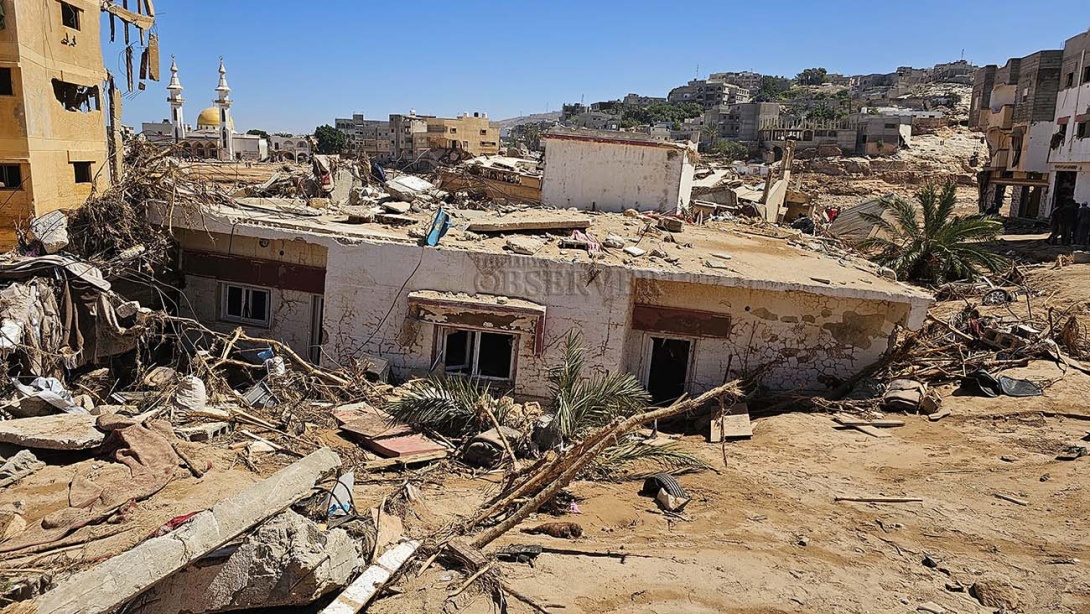By Youssef Lutfi, political writer
The Exposing Derna Tragedy

The city of Derna was struck by one of the largest natural disasters that the world has witnessed during the last decade, as the collapse of the two dams in the Derna Valley (the Al-Belad Dam with a capacity of 15 million cubic metres, and the Bu Mansour Dam with a capacity of 22 million cubic meters) led to a huge flood - estimated to be three times its capacity. The Dams have bulldozed the nearby areas and neighborhoods adjacent to the valley, throwing them into the sea and changing the features of the city forever.
The old city and the shrines of the graves of the conquering Prophet Companions, may Allah be pleased with them, represent a witness to the extent of the change that has affected features of the city. These historical monuments withstood the floods that the city witnessed throughout its history, but this flood led to their complete destruction and indeed reducing them to nothing.
The flood was like a reverse tsunami that swept away all the neighborhoods and residences in its path. It also destroyed the northern roads leading to the city and connecting its western and eastern parts. The widespread pictures and videos show the scale of the disaster that befell the city, as floods swept away and submerged more than a third of the city.
Preliminary estimates of the number of deaths indicate that they may exceed 20,000, according to Al-Bayda Medical Center’s estimates. The number of confirmed deaths has exceeded 11,000 cases as of September 13, with the numbers rising with the continued arrival of rescue teams and international civil defense teams. As for the number of missing persons, the Libyan Red Crescent has recorded about 12,000 confirmed missing cases, while the number of displaced people has reached about 30,000 in a city of 120,000 people!
State corruption and society’s role:
The collapsed dams are approximately fifty years old. They were built in the early 1970s and have not witnessed any maintenance or restoration for more than 20 years. Scientific studies and symposiums over the past years have warned of the danger posed to Derna Valley, its dams and the roads, including a doctorate thesis published in 2022, by Dr. Abdel-Wanis Ashour which concluded the following:
“The current situation in the Wadi Derna basin necessitates that officials take immediate measures by conducting periodic maintenance operations on the existing dams, because in the event of a huge flood, the result will be disastrous for the residents of the valley and the city. A way must also be found to increase the vegetation cover so that the soil is not allowed to drift, erode and to reduce the phenomenon of "desertification"
“During the field visit to Wadi Derna, we found some dwellings in the valley’s course, which requires educating residents about the danger of floods and taking all necessary measures and procedures to maintain their safety.”
While Libyans from all cities, east, west, and south, are busy in volunteer rescue operations and providing the necessary relief to help the people of Derna, the scenes of the collapse of infrastructure in a number of cities in the east of Libya and the huge losses it has caused in lives and material, the disruption of public life, and the burden on citizens. Huge material and moral losses, death tolls and the extent of catastrophic damage in the city of Derna prompted the world to wonder about the extent of corruption and laxity in state agencies and institutions, which led to the absence of minimum security and safety measures, as well as primitive services and rights that would preserve the safety of citizens.
The National Audit Bureau’s 2021 report, provides part of the answer, as the report reveals in the second chapter many aspects of corruption that have ravaged and are ravaging the Ministry of Water Resources. The report states under the heading “Transformation Budget” the “Ministry’s failure to take the necessary measures regarding the stalled projects,” the most important of which is the project for the maintenance and rehabilitation of the Derna Dam, for the amount of about 15 million dinars.
Despite the report’s revelation in terms of forms of financial corruption in the ministry, it remains part of the overall scene. Responsibility cannot be limited to a single ministry or municipality, nor can it be summed up in the corruption of a few years. Lack of competence or preparedness is a general characteristic of all parties concerned with the crisis, starting from the central government, passing through the National Safety Authority and Civil Defense, and ending with the municipality and local agencies. Parliament holding its emergency session four days after the disaster occurred, reflects the extent of insensitivity and the absence of the slightest sense of responsibility. Statements of Parliament Speaker, Agila Saleh, which revolved around disclaiming their responsibility for what happened, also reveal the extent of the recklessness of these parties despite the enormity of the mistake and the catastrophic consequences. In fact, Parliament’s inaction reached such an extent that the doors of its headquarters, which is less than 30 km away from Derna and which has a capacity of about 1,000 people, and equipped with a helicopter landing pad and equipped health facilities, the doors of this headquarters, which belongs to the people of this country, remained closed in the face of the largest humanitarian disaster in the country’s history.
Derna is a city that has suffered from floods throughout its modern history. It is an “estuary” city surrounded by highlands. According to assessments by experts and specialists, large parts of the city are unfit for habitation and residence, and the roads leading to it and surrounding the valley are dilapidated. In addition to the absence of necessary equipment, procedures and systems for warning in emergency situations or the existence of evacuation plans and other primitive and necessary procedures are the responsibility of the central and local authorities, ministries and bodies, and finally the military authorities that tighten their grip on institutions in the east of the country, whose annual allocations reach relatively record levels.
The municipality of Derna, is headed by Abdul Moneim Al-Ghaithi, Aqila’s nephew. Saleh allocated 400 million dinars to the municipality, while about half a billion dinars were allocated to the Ministry of Water Resources, in addition to the budgets allocated to the rest of the sectors and responsible bodies, without this being reflected in the performance of these bodies of their tasks and duties.
On the other hand, the movement of spontaneous popular campaigns first to save the city and provide relief to its people represents the greatest evidence not only of the failure and corruption of the state apparatus, but also of the failure of civil society institutions and civil relief organizations. The failure of civil society institutions represents a dangerous indicator of confusion in the values guiding the work of these institutions and their disconnection from community’s pressing and pivotal issues. Community and humanitarian issues that are urgent and central to people’s lives.
The tragedy of Derna exposes what is far deeper than just financial corruption in an administration, institution, or ministry. It unveils a story of moral decay and loss of values - which is approaching its end levels - thus turning corruption into a natural part of political practice, the collapse of the public sense of responsibility, and the absence of civil institutions from public affairs in the country. The absence of any signs of reform on the horizon continues to point to one of two directions: implosion or collapse.
The absence of a clear collective moral position on the Libyan street regarding issues of corruption, injustice and tyranny is the basis on which the corruption of political authority and the decline of the societal sense of responsibility towards the nation are based. All administrative and legal solutions proposed to address the corruption rooted in the body of the state will remain weak solutions that revolve in the orbit of bureaucracy of the state which is targeted for remedy!
Disclaimer: The views and opinions expressed in this article are those of the writer, and do not necessarily reflect those of the Libya Observer


